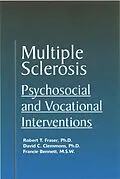This book provides a practical perspective on cognitive concerns and their relationship to vocational and psychosocial adjustment issues for people with multiple sclerosis (MS). It also provides practical approaches to rehabilitation, vocational, and psychosocial interventions, with illustrative case studies. Of particular note is that all tables, figures, and case study material complement the text and can be used for PowerPoint slides or overheads in training programs for allied health personnel.
Of particular interest are discussions of the cognitive issues in MS, which have not previously been well discussed in the literature, clear discussions of assessment tools and placement models in vocational assessment and rehabilitation planning, and an extensive reading list and self-help resource lists that will be of assistance in understanding psychosocial adjustment in this population.
This guide is an outgrowth of vocational rehabilitation counselor training conducted by the authors, and feedback from the counselor attendees helped to refine the book. It will be helpful to vocational rehabilitation counselors and to all members of the health care team concerned about the psychosocial status of their clients with MS.
The book is divided into four sections:
- A broad-based medical overview provides a basic discussion of the course of the MS disease process, its diagnosis and symptomatology, medical treatments, and rehabilitation
- A discussion of neuropsychological concerns, including concepts of importance in vocational rehabilitation and the specific cognitive and related impairments that are characteristic of MS and that cause vocational difficulties
- A review of vocational rehabilitation interventions focusing on assessment and rehabilitation planning
- A review of psychosocial issues and interventions that focus on a wide range of issues affecting the family and community
Inhalt
Multiple Sclerosis: A Medical Overview; Disease Course; Diagnosis and Symptomatology; Medical Treatment and Medication; Rehabilitation; Neuropsychological Concerns; Neuropsychological Concepts Important in Vocational Rehabilitation; Attention and Concentration; Memory Function; Language Abilities; Visual-Spatial Ability; Cognitive Flexibility; Executive Functioning; Patterns of Neuropsychological Deficit in Multiple Sclerosis; Neuropsychological Batteries; Obtaining a Neuropsychological Evaluation; Working with the Neuropsychologist; Case Study; Sample Neuropsychological Evaluation; Vocational Rehabilitation Interventions; A Brief History of MS Vocational Rehabilitation; Vocational Assessment; Case Study; Rehabilitation Planning in MS Rehabilitation; Psychosocial Issues and Interventions; Grief Reactions; Emotional Triggers; Family and Significant Others; Community Reactions; Integration of psychosocial Issues and Neuropsychological Status; Counseling Issues and Strategies; Community Referrals; Recommended Reading; Psychosocial Issues in Vocational Success; Case Study; Considerations in Psychosocial Intervention; Appendixes; Appendix A: U.S. Department of Labor Statement of Principle and Guidelines; Appendix A: Work Experience Survey; Appendix A: MS Information Treatment Centers; Appendix A: National Multiple Sclerosis Society Chapters/Divisions/Branches; Appendix A: About the Paralyzed Veterans of America (PVA);Index.
